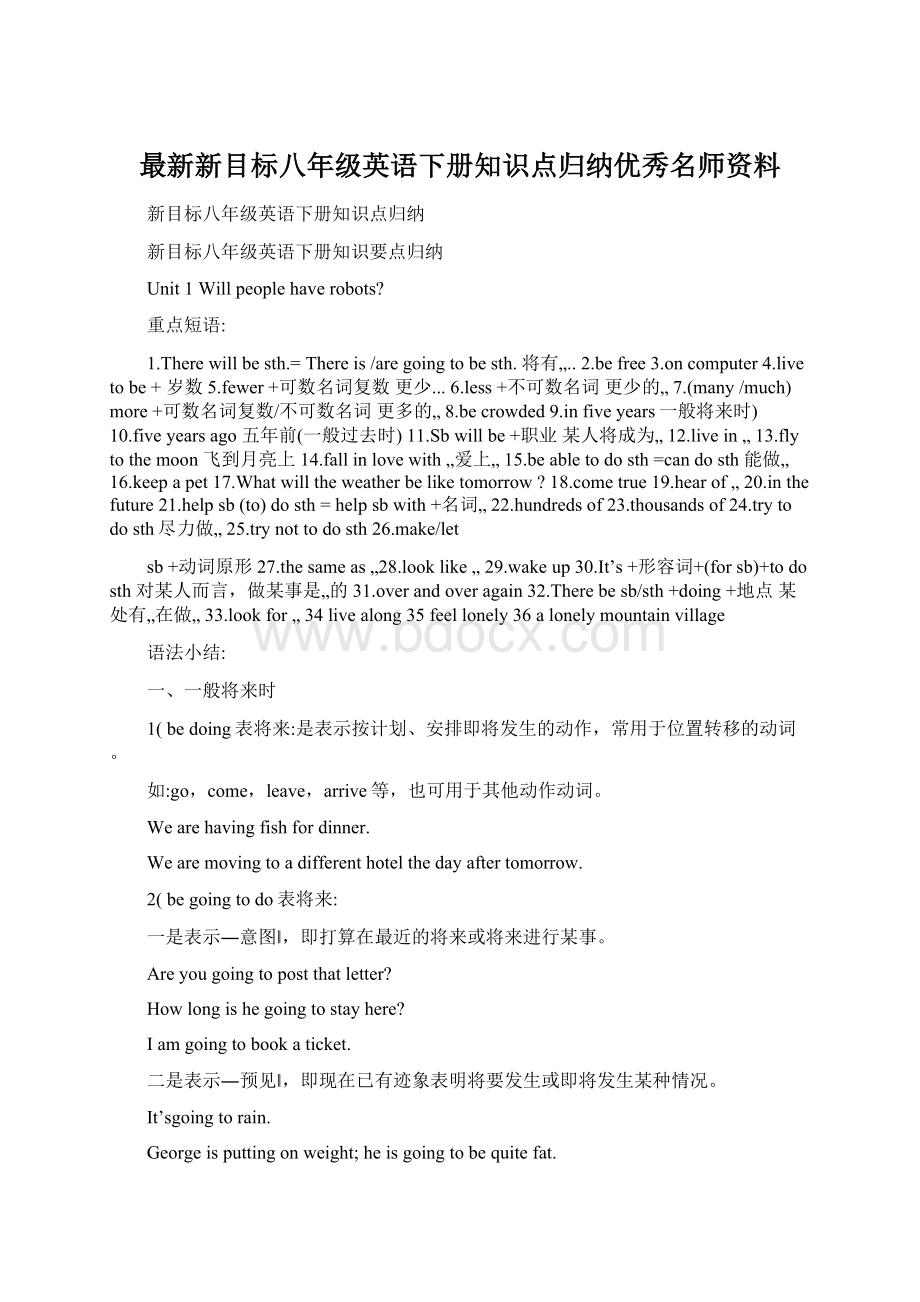 最新新目标八年级英语下册知识点归纳优秀名师资料Word格式文档下载.docx
最新新目标八年级英语下册知识点归纳优秀名师资料Word格式文档下载.docx
- 文档编号:16240909
- 上传时间:2022-11-21
- 格式:DOCX
- 页数:96
- 大小:125.79KB
最新新目标八年级英语下册知识点归纳优秀名师资料Word格式文档下载.docx
《最新新目标八年级英语下册知识点归纳优秀名师资料Word格式文档下载.docx》由会员分享,可在线阅读,更多相关《最新新目标八年级英语下册知识点归纳优秀名师资料Word格式文档下载.docx(96页珍藏版)》请在冰豆网上搜索。

Youwillfeelbetteraftertakingthismedicine.
Doyouthinkitwillrain?
二是表示意图.
Iwillnotlendthebooktoyou.
Takeiteasy,Iwillnotdoitanylonger.
基本结构:
Shewillcometohaveclasstomorrow.
Willshecometohaveclasstomorrow?
Shewon’tcometohaveclasstomorrow.
Whatwillshedotomorrow?
Therebe的一般将来时两种
therewillbe
thereisgoingtobe
三、课文难句解析
1
1.Willpeopleusemoneyin100years?
一百年后人们还会使用钱币吗,
1)money金钱;
货币papermoney纸币;
钞票
2)in100years在100年之后
―in+一段时间‖常用在将来时态中,常用howsoon提问
eg(I'
llcomeinanhour.
2.Therewillbelessleisuretime(空闲时间会更少。
less形容词:
较少的little--less–least修饰不可数名词
few—fewer--fewest修饰不可数名词
many/much—more--most修饰<
不>
可数名词
eg(Jane'
slessbeautifulthanMary.
3.Ithinktherewillbemorepollution(我认为将会有更多的污染产生。
1)think后跟的是宾语从句,且宾语从句是therebe句型的一般将来时,结构为―therewillbe+物+其他成分‖。
eg(Ithinkitwillraintomorrow.我认为明天会下雨。
2)pollution表示―污染‖,用作不可数名词。
例如:
Theydidalottostopwaterpollution(他们采取大量措施制止水污染。
4.Idon'
tagree(我不同意。
Idon'
tagree(―不赞成某人或某人的观点‖,
Iagree。
表赞成
1)agreewithsb:
―同意某人意见‖
eg(Didyouagreewithhim?
你同意他的意见吗?
tagreewithwhatshesaid(我不同意她所说的。
2)agreeto(+接名词、代词或者相当于名词的成分)表示赞同某建议,安排
eg(Iagreetoyouridea(我同意你的想法。
3)agreeon(或upon)表示―就某时间,地点,人物等取得一致意见‖
eg(Theybothagreedonthedateforthemeeting(他们双方都同意开会的日期。
4)agreetodosth,表示―同意做某事‖。
eg(Theyagreedtoleavetomorrowafternoon(他们同意明天下午动身。
5.What(doyouthink)Sallywillbeinfiveyears?
你认为萨莉5年之后将会是什么样子?
(插入语,用于特殊疑问词之后)其后接的宾语从句必须用陈述句语序。
eg(Whichbookdoyouthinkshewilllike?
你认为她会喜欢哪本书?
Whodoyouthinkdidit?
你认为是谁干的那件事?
6.Ican'
thaveanypetsbecausemymotherhatesthem.我不能养宠物,因为我妈不喜欢他们
1)because在这句中用作连词,引导原因状语从句,表示―因为‖。
注意在英语中because不能和so
同时使用。
eg(Johndidn'
tgotoschoolbecausehewasill.约翰没有上学,因为他病了。
2)hate表示―不喜欢,憎恨‖,后可跟名词或代词作宾语,也可用词组hatedoingsth.,表示―讨厌做某事‖。
eg(Hehatedflowers.他讨厌花朵。
7.I'
llprobablygoskatingandswimmingeveryday.我会每天都去滑冰和游泳。
1)godoingsth.结构,表示―去做……
goskating去滑冰goswimming去游泳goshopping去买东西gofishing
去钓鱼goboating去划船
eg(Myfathergoesfishingeveryweek(我爸爸每周都去钓鱼。
2)everyday与everyday区别:
2
everyday表示―每天‖,通常与一般现在时连用;
everyday表示―日常的,每天发生的,每日所用的‖,是形容词。
eg(Igetupatsixeveryday.我每天6点起床。
8.DuringtheweekI’lllooksmart,andprobablywillwearasuit(
1.wear强调状态:
Shewearsawhiteskirttoday.
2.puton强调动作:
It'
scoldoutside.Putonyourcoatplease.
3.dress后面加―某人‖:
Tomisoldenoughtodresshimself
4.bein后面加衣服或颜色:
Sheisinareddress.Sheis...
9.Whatdoyouthinktheweatherwillbeliketomorrow?
Whatbe…like?
用来征求对方对某事的看法或意见,―……怎么样?
‖类似的
Whatdoyouthinkof…?
Howdoyoulike…?
。
eg(Whatisthebooklike?
Whatdoyouthinkofthebook?
Howdoyoulikethebook?
你觉得这本书怎么样?
What'
stheweatherliketoday?
Howistheweathertoday?
今天天气怎么样?
2)Whatis,are…1ike?
可用来提问天气情况
也可用来对人(或物)的外观、外貌提问;
还可以用来对其特性提问。
eg(What'
10.Thereweremanyfamouspredictionsthatnevercametrue((过去)有许多从没成为现实。
著名的预测
1)本句中thatnevercametrue是个定语从句,用于修饰先行词predictions,that为引导词,作定语从句的主语,不可省略。
2)cometrue指―理想,梦想等实现‖。
come是连系动词;
true是形容词,做连系动词come的表语。
eg(Mydreamwillcometruesomeday.有一天我的梦想会实现。
Unit2WhatshouldIdo?
1.wantsbtodosth=wouldlikesbtodosth2.arguewith..和„争吵3.outofstyle过时4.instyle流行的5.adj/adv+enough足够的„6.enough+n足够的7.What’swrongwith„?
=What’sthematter/trouble/problemwith„?
某人/某物怎么啦,8.callsbup=callsb9.atickettoaballgame一场球赛的票10.writesbaletter=writealettertosb11.onthephone12.talkabout13.besurprisedatsth/doingsth对„感到惊讶14.getaparttimejob找到一份兼职工作15.borrowsthfrom„从„借到„16.lendsthtosb把„借给„17.asksbforsth向某人请求18.either也否定句句末too肯定句句末19.buysthforsb=buysbsth
为某人买„20.liketodosth/likedoingsth21.That’sagoodidea22.tellsb(not)todosth23.Idon’tknowwhattodo24.else别的位于特殊疑问词和不定代词之后(somebodyelse,whatelse)other放在名词之前25.exceptsb/sth/doingsth除„之外(不包括)besides除„之外还有26.beupset沮丧27.leavesth+介词地点把„遗忘在„28.geton/alongwellwithsb29.havea(fightwith)sb30.givesomeadvice31.busyenough32.from„to33.It’stimefor+名词=It’stimetodosth该做„的时候了34.asmuchaspossibleplainaboutsb/sth/doingsth抱怨„36.undertoomuchpressure37.takepartin38.seesbdoingsth看见某人在做„seesbdosth看见某人做了„pare„with„把„和„作比较40.sendsb.sth.=sendsth
3
tosb41.Sb.findit+形容词+todosth某人发觉做某事是„的eg:
Wefinditimportant
tolearnEnglish.42.ontheonehand43.ontheotherhand2(目标句型:
1.WhatshouldIdo?
2.Whydon’tyou…?
3.Youcould…4.Youshould…5.Youshouldn’t…3(语法情态动词的用法?
【重难点分析】
情态动词(ModalVerbs)?
*情态动词也可称为―情态助动词(ModalAuxiliaries)‖,因为它和基本助动词(be,do,have)都属于助
动词类。
*情态动词和其他动词连用,可表示说话人的语气。
*情态动词可表达建议、要求、可能和意愿等。
*情态动词没有人称和数的变化。
*常用的情态动词有:
can,could,may,might,must,shall,should,will,would这九大情态动词;
其他
的还有oughtto,need,dare等。
一、九大情态动词的时态关系:
1.现在式can--过去式could
2.现在式may--过去式might
3.现在式shall--过去式should
4.现在式will--过去式would
5.现在式must--过去式must(常用hadto来代替)
二、情态动词表示“可能”或“预测”
(can,could,will,would,shall,should,must,oughtto)
(1)can和could用于表示“可能”或“预测”:
1.Hecan'
tbeathome.(否定句)
他不可能在家。
2.Canthenewsbetrue?
(将情态动词can置于主语thenews前就成疑问句)
这消息可能是真的吗?
3.Anybodycanmakemistake.(只表示理论上的可能性)任何人都可能犯错误。
(2)may和might用于表示“事实上的可能性”或“预测”:
1.Itmayraintomorrow.(表示可能会发生)明天可能会下雨。
2.Itmaysnowlaterthisafternoon.(表示预测)今天下午可能会下雪。
3.Youmightberight.(表示有可能)你可能是对的。
(3)will和would用于表示“预测”或“习惯性”:
1.Ithinkhewillbeallrightnow.(willbe表示一定会)我想他现在一定好了。
2.Thatwouldbehismother.(wouldbe表示肯定是)那肯定是他母亲。
3.Hewillsittherehourafterhourlookingattheriver.(will表示经常的)
他经常一连几个小时坐在那儿看着河水。
(4)shall和should用于表示“必定”:
1.Ishallberichoneday.(shallbe)总有一天我会发达的。
2.ThatshouldbeSamandhismother.(shouldbe)那准是Sam和他的母亲。
(5)must用于表示“必定”,“必会”:
1.Thismustbegoodforyou.(mustbe肯定)这肯定对你是有益的。
2.Allmankindmustdie.(表示必然会发生的事)所有的人一定会死的。
3.Mustn'
ttherebeamistake?
(mustn'
t多用于疑问句)那肯定会有错误吗,
三、情态动词表示“许可”、“请求”
4
(can,could,will,would,shall,should,may,might,must)
(1)can和could用于表示“许可”、“请求”:
1.CanIgowithyou?
(请求)我能跟你一起走吗,
2.FathersaidIcouldgotocinema.(表示过去的许可)爸爸说我可以去看电影。
3.CouldIaskyousomething?
(请求,用could比can更婉转)我可以问你一件事吗,
(2)will和would用于表示“请求”
1.Willyoukindlytellmethewaytothepostoffice?
(表示客气请求)
请问到邮局怎么走,
2.Wouldyougivemeyouraddress?
(用would比will表示更客气)
请你告诉我你的地址,好吗,
(3)shall和should用于第一人称,表示征求对方的意见
1.Shallwetalk?
我们谈谈好吗,
2.Whatshouldwedonext?
(用should比shall表示更客气)下一步我们该怎么做,
3.Shallhecometoseeyou?
(用于第三人称疑问句)要不要他来看你,
(4)may和might用于表示“许可”(口语中多用can)
1.Youmaytakeawalk.(表示给予许可)你可以散散步。
2.Youmightreadthestoryforme.(比may更婉转)是否请给我读一读这故事。
3.MayImakeasuggestion?
我可以提个建议吗,
4.MightItakealookofyourwork?
我看看您的大作行吗,
5.Studentsmaynotmakenoiseinthelibrary.(maynot表示不许可或禁止)
学生不得在图书馆里吵闹。
.IfImaysayso,youarenotright.(用于条件句,表示请求)6
你是不对的,如果我可以这么说的话。
(5)must用于表示“禁止”,“不准”:
1.Carsmustnotbeparkedhere.(mustnot表示不许可)此地不准停车。
2.Allofyoumustn'
tfishinginthepool.(mustnot语气方面比maynot更强)
你们不准在池里钓鱼。
四、重要短语和表达法(KeyWords)
1(arguev(争论;
争吵arguewithsb(与某人吵架
Iarguedwithmybestfriend(Don’targuewithhim.
2(?
eitheradv.(用于否定句)也
Hedoesn’thaveanymoney,andIdon’t,either(Ican’tplaychess.Shecan’t,either.。
?
too也(用于肯定或疑问句)
I’mateacher(Heisateacher,too(
3(ask(sb()forsth(向某人寻求某物;
要„„
Ifyouhaveanyproblems,youcanaskthepolicemanforhelp.如果你有困难,可以向警察求助。
Hedidn'
twanttoaskhisteacherforhisbookback(他不想向老师要回他的书了。
4(thesameas...与„„相同
Herbackpackisthesameasmine.她的背包与我的一样。
5(except除„„以外;
(不包括„„在内)
Myclasshasbeeninvitedexceptme(,OnlyIhaven'
tbeeninvited(除我以外,我的同学都被邀请了。
Allthestudentswenttotheparkexcepthim(,Onlyhedidn'
tgettothepark(besides除„„以外(包括在内)
5
Weallwenttherebesideshim(,Hewentthere(Wewentthere,too(除他去以外,我们也都
去了。
6(wrongadj(错误的;
有毛病的;
不合适的
Isthereanythingwrongwithyou?
你哪儿不舒服,
What'
swrongwithyou?
你怎么了?
(你哪里不舒服?
)
I'
vegotaheadache(我头痛。
What’swrongwithyourwatch?
Itdoesn'
twork.你的手表怎么了,它不走了。
adv(错误地;
不正确地;
不对地
Heanswer
- 配套讲稿:
如PPT文件的首页显示word图标,表示该PPT已包含配套word讲稿。双击word图标可打开word文档。
- 特殊限制:
部分文档作品中含有的国旗、国徽等图片,仅作为作品整体效果示例展示,禁止商用。设计者仅对作品中独创性部分享有著作权。
- 关 键 词:
- 最新 新目标 年级 英语 下册 知识点 归纳 优秀 名师 资料
 冰豆网所有资源均是用户自行上传分享,仅供网友学习交流,未经上传用户书面授权,请勿作他用。
冰豆网所有资源均是用户自行上传分享,仅供网友学习交流,未经上传用户书面授权,请勿作他用。


 广东省普通高中学业水平考试数学科考试大纲Word文档下载推荐.docx
广东省普通高中学业水平考试数学科考试大纲Word文档下载推荐.docx
